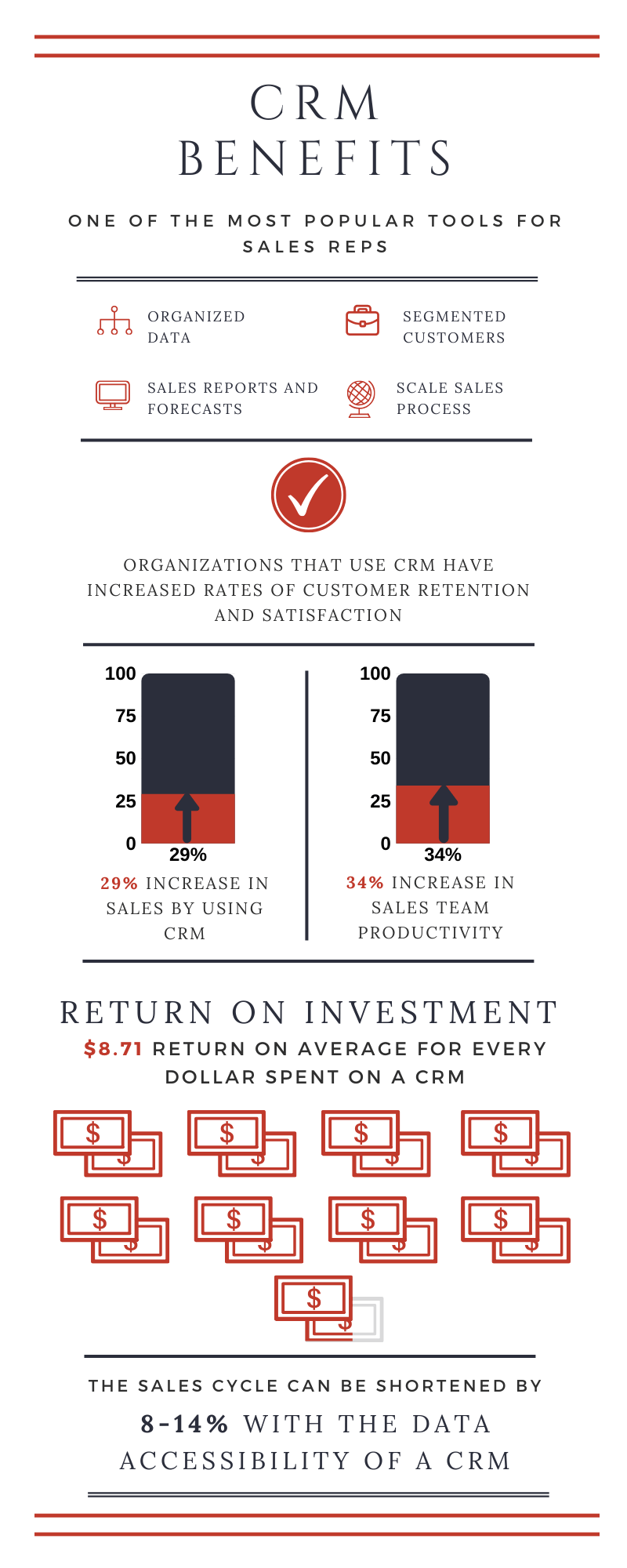
Technology trends come and go but CRM is standing the test of time. CRM or customer relationship management is a powerful tool that has become an essential partner to sales teams everywhere. It helps sales reps stay on top of their customers by organizing and analyzing customer data. If you choose the right CRM platform for your business and industry the benefits could be endless.
Let’s take a look at some benefits of a CRM below:

Here are some of the major benefits your
sales team can expect from your CRM:
Centralized Database
Your CRM will provide you with a centralized database across your entire sales organization. This will give your entire sales team access to all prospect information allowing cross-team access and keeping everyone on the same page. Information can, therefore, be updated and managed in one place preventing errors and duplicates. It also helps reps avoid digging around for their customer info, they can pull up prospect info whenever they need it to follow up and close deals.
Managing Communications with Prospects
Your CRM can manage all of your external and internal communications and interactions. This means that you can track every part of the buyer’s journey; i.e. emails, phone calls, messages and more. This, in turn, helps reps to easily determine when they need to follow up with specific prospects and further still it lets them know if they have already followed up so that they do not send doubles annoying the prospect.
Automated Data Entry
CRMs make data entry easy by automating the logging of emails, calls, meetings, and interactions. Reps can also tag their deals by their stage and your CRM will automatically do the rest i.e. weighting, summation, visualization, etc.
Follow Up Reminders
Not only is it easy to see when you should follow up with prospects in a CRM system but CRM makes it even easier by reminding you when to follow up with specific prospects. CRMs can identify when support will be the most helpful to specific prospects and alert the sales rep to follow up at that time, increasing the reps’ chances of making a conversion.
Organizing Data
Your CRM will allow your team to easily
organize and manage contact data no matter where they are in the buyer’s
journey. It allows you to see prospect activity like visiting the website,
downloading content or contacting another member of the sales team. Also, reps
can log all of their interactions and communications with each prospect on their
customer profiles.
Segment Customers
Your CRM allows you to sort your contacts by specific criteria like location, company size, etc. This allows you to specifically position outreach to contacts by segment.
Report Creation
Your CRM will then take the data it automatically collects and creates reports. Sales reps can use these to improve their sales strategies by better automating their pipelines, deals, and contracts. These reports also allow them to keep track of their goals and evaluate personal performance. Likewise, sales managers can use these reports to make sure that their reps are on track to meet their quotas.
Sales Performance Forecasting
A CRM can also automatically forecast your sales performance by pulling out key metrics to identify trends. This allows sales reps to plan strategically, make informed decisions, create sales projections, and adjust pipelines where necessary. This benefits Sales reps and managers can also use this feature to identify which activities and strategies are more profitable.
Scaling Your Sales Processes
Another benefit of CRM is that it allows you to keep track of your leads, prospects, and customers all in one place. As a result, sales reps and managers can use the CRM to identify patterns in the data to see which sales processes are working and which can be improved therefore scaling your processes as your business grows.
Team Communications
Your CRM also facilitates inter-team communications allowing sales reps to work together, learn from each other and maintain a specific brand image across the board. Reps do not need to leave the system to send messages or emails to team members, this can all be done within the CRM. Reps can tag specific team members and managers on deals that they would like to bring them into. Managers can also use this feature is they need to reassign leads to a different rep.
Keep The Same Software
Ensure that you stick with the same software as your company continues to grow because your CRM is meant to grow with you. Eventually, your CRM can branch out to assist other departments in your organization like customer service, marketing, etc. until your entire company is under the CRM umbrella contributing to and benefiting from the system.
Efficient Administrative Tasks
Lastly, your CRM can make administrative tasks more efficient, which means that it automates more functions like data entry, hunting for email chains and saving contact info allowing you to have more time to focus on what you do best; selling.
An intuitive CRM system will provide staggering benefits for your company and over time increase sales and make your team more efficient, boosting their productivity and morale. Think about how a CRM system will work best with your business and make sure you have buy-in from all team members to truly see how a CRM can boost your conversions and make a difference on your bottom line.
Technology trends come and go but CRM is standing the test of time it is a powerful tool that has become an essential partner to businesses everywhere. Check out this blog!





